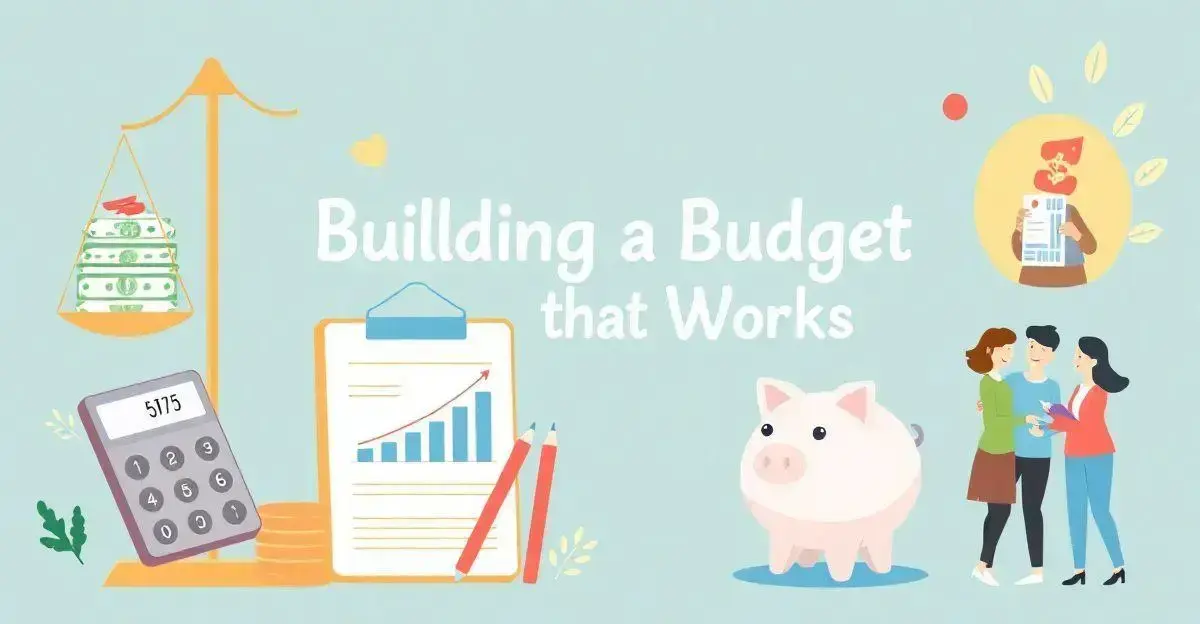Foundations in personal finance are crucial for anyone looking to achieve financial stability.
By understanding essential concepts like budgeting, saving, and investing, you can take control of your finances and secure your future.
Understanding Personal Finance Basics
Understanding personal finance basics is essential for everyone to achieve financial stability. It starts with knowing how to manage your income effectively. Create a budget that outlines your monthly earnings and expenses. This will help you track where your money goes and find areas to save.
One key aspect is saving for emergencies. Aim to set aside at least three to six months’ worth of expenses in a separate account. This safety net will provide peace of mind against unexpected situations, such as medical bills or job loss.
Additionally, learn about the importance of credit scores. Your credit score influences your ability to get loans or rent a home. Make sure to pay bills on time and avoid carrying high balances on credit cards.
Investing is also crucial. Start with simple options like a 401(k) or IRA. These accounts help your money grow over time due to compound interest. The earlier you start investing, the more you can accumulate over the years.
Finally, regularly review and adjust your financial plan. As your life changes, your budget and savings goals may need to shift. Stay proactive to ensure that your financial foundation remains strong.
Building a Budget that Works

Building a budget that works is a key part of personal finance. Start by tracking your income and expenses for a month. This will give you a clear picture of your financial habits. List all sources of income, including salaries, bonuses, and any side gigs.
Next, identify your essential expenses such as rent, utilities, groceries, and transportation. It’s important to separate needs from wants. Once you have a list, categorize your spending to see where most of your money goes.
Now, create a budget plan. You can use a simple spreadsheet or budgeting apps. Ensure that your total expenses do not exceed your income. Aim to allocate at least 20% of your income to savings and debt repayment.
Be realistic. If you are spending more on dining out than anticipated, adjust your budget. You might need to cut back on some discretionary expenses. Make your budget flexible so that you can adapt when needed.
Regularly review your budget, perhaps monthly, to ensure it is working for you. Keep track of any changes in income or expenses and adjust your plan accordingly. All these steps will help you build a budget that truly works.
The Importance of Saving and Investing
The importance of saving and investing cannot be overstated in personal finance. First, saving helps you build an emergency fund. This fund acts as a safety net during unexpected circumstances like medical emergencies or job loss. Aim to save at least three to six months’ worth of expenses in a high-yield savings account.
Investing, on the other hand, is crucial for growing your wealth over time. While saving keeps your money safe, investing puts your money to work. Consider starting with simple options like stocks, bonds, or mutual funds. The earlier you start investing, the more you benefit from compound interest.
Additionally, both savings and investments should be part of a long-term financial plan. By balancing these, you can prepare for retirement, buy a home, or fund your child’s education. Establish a habit of saving a portion of your income every month and increase your contributions as your financial situation improves.
Finally, regularly review your savings and investment strategies. Assess whether they align with your financial goals. Adjust your plans based on life changes, market trends, or personal preferences. Understanding the importance of both saving and investing will help you secure a brighter financial future.
Managing Debt Wisely

Managing debt wisely is an essential part of personal finance. Begin by understanding the types of debt you have. This includes credit card debt, student loans, and mortgages. Each type has different interest rates and terms, which affects your payment strategies.
Prioritize paying off high-interest debts first. By focusing on these, you can save money in interest payments over time. Consider making more than the minimum payment whenever possible. This reduces your overall balance and can help you pay off your debt faster.
Another strategy is to consolidate your debt. Look into taking out a lower-interest loan to pay off higher-interest debts. This can simplify your payments and lower your monthly expenses.
Additionally, create a budget that includes a plan for your debt payments. Set aside a specific amount each month dedicated to paying down your debts. Make this a priority in your financial planning.
Finally, avoid accumulating more debt. Limit the use of credit cards and ensure that any new loans fit within your budget. By managing your debt wisely, you can achieve a healthier financial future.
Setting Financial Goals
Setting financial goals is a critical step in managing your personal finance. Start by identifying what you want to achieve, whether it’s buying a home, saving for retirement, or funding your child’s education. Write down these goals to make them more tangible and motivate yourself to reach them.
Once you have your goals, categorize them into short-term, medium-term, and long-term goals. Short-term goals might be saving for a vacation, while medium-term could include saving for a car. Long-term goals typically involve retirement savings or college funds.
Use the SMART criteria to outline your goals. This means they should be Specific, Measurable, Achievable, Relevant, and Time-bound. For example, instead of saying, “I want to save money,” say, “I will save $5,000 for a vacation within the next year.” This way, your goals become clearer and more manageable.
Next, create a plan to achieve these goals. Break them down into smaller, actionable steps. For instance, if your goal is to save for a house, you might need to save a certain amount each month. Consider setting up automatic transfers to a savings account to help you stay on track.
Finally, review and adjust your goals regularly. Life changes, and so may your priorities. Periodic review helps you stay focused on what’s most important and keeps you motivated toward achieving your financial dreams.
Reviewing Your Financial Health Regularly

Review your credit report at least once a year for accuracy and insights on your credit history.
Assess your monthly budget to ensure you are not overspending. Adjust if necessary.
Evaluate your savings and investment accounts to ensure they align with your financial goals.
Calculate your debt-to-income ratio to monitor your debt levels and maintain financial stability.
Conduct a complete financial health check quarterly to stay informed and proactive about your finances.
Mastering Personal Finance: Keys to a Stable and Prosperous Future
Understanding the foundations in personal finance is crucial for achieving financial stability and success. By learning to budget effectively, manage debt wisely, and set clear financial goals, you can take control of your financial future.
Savings and investment serve as the backbone of a secure financial life, allowing for growth and emergency preparedness. Regularly reviewing your financial health keeps you informed, helping you adapt to changes and stay focused on your goals.
By applying these principles and strategies, you empower yourself to make sound financial decisions that can lead to a more prosperous life.